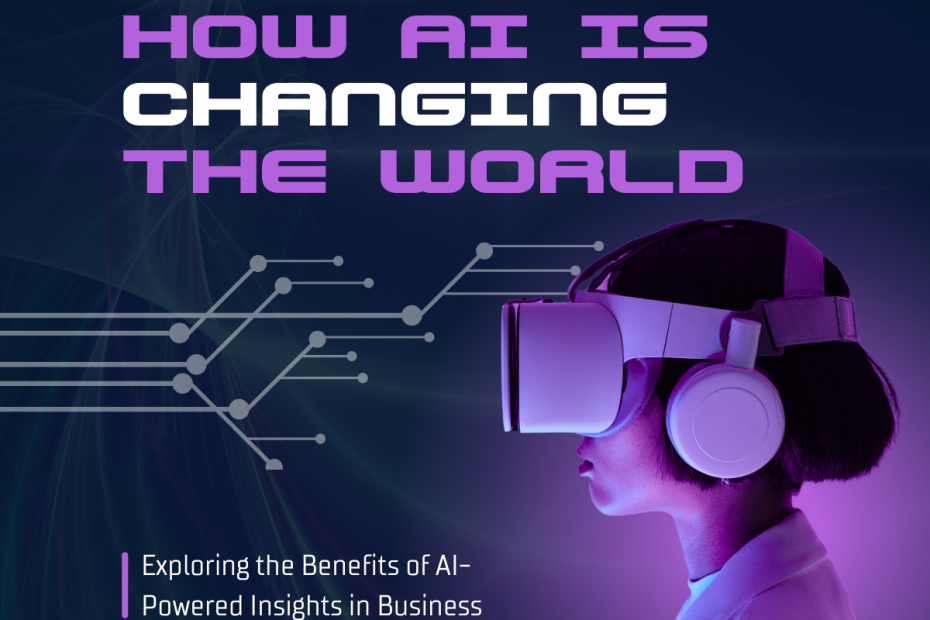The Transformational Impact of AI on the World
Artificial Intelligence (AI) is revolutionizing various aspects of our lives and changing the world in profound ways. It has emerged as a transformative force with applications spanning across industries, from healthcare and finance to transportation and entertainment. In this comprehensive guide, we’ll explore how AI is reshaping the world, its key areas of impact, and the ethical and societal considerations that come with this technological revolution.
Understanding Artificial Intelligence
Artificial Intelligence refers to the simulation of human intelligence in machines, enabling them to perform tasks that typically require human intelligence. AI systems can analyze data, make decisions, recognize patterns, and even interact with humans. It encompasses various subfields, including machine learning, natural language processing, computer vision, and robotics.
Key Areas of Impact
AI’s influence extends to numerous domains, driving innovation and efficiency. Here are some key areas where AI is making a significant impact:
1. Healthcare
AI is transforming healthcare through disease diagnosis, drug discovery, and personalized treatment plans. Machine learning models analyze vast amounts of medical data, leading to quicker and more accurate diagnoses. Surgical robots and telemedicine are enhancing patient care and access.
2. Finance
In the financial sector, AI is used for fraud detection, algorithmic trading, and risk assessment. Chatbots provide customer support, and robo-advisors offer investment guidance. AI-driven credit scoring is revolutionizing lending practices.
3. Transportation
AI plays a central role in autonomous vehicles, improving road safety and traffic management. It optimizes logistics and routing for transportation and delivery services. Public transportation systems benefit from predictive maintenance and scheduling.
4. Entertainment
AI enhances content creation, from recommendation algorithms on streaming platforms to the generation of music and art. In gaming, AI creates dynamic and adaptive gameplay experiences.
5. Manufacturing
AI-driven automation and robotics improve efficiency and quality control in manufacturing processes. Predictive maintenance reduces downtime, and AI-driven supply chain management optimizes production and distribution.
6. Education
AI personalizes education by adapting content to individual learning styles. Chatbots provide support, and data analytics help educators make data-informed decisions.
7. Agriculture
AI aids in precision agriculture, optimizing crop management, and resource allocation. Drones and AI monitor crops, detect diseases and improve yield.
8. Environmental Sustainability
AI is used in climate modeling, weather forecasting, and the analysis of environmental data. It aids in managing resources efficiently and reducing energy consumption.
9. Cybersecurity
AI is employed to identify and mitigate cyber threats, as it can analyze vast datasets to detect anomalies and potential security breaches.
10. Space Exploration
AI contributes to space exploration by autonomously operating rovers, analyzing astronomical data, and optimizing mission planning.
Ethical and Societal Considerations
The transformative power of AI also raises ethical and societal concerns:
1. Bias and Fairness
AI systems can perpetuate biases present in training data, leading to unfair outcomes in areas like criminal justice, hiring, and lending. Addressing bias and ensuring fairness is a crucial challenge.
2. Privacy
The extensive collection and analysis of personal data by AI systems raise concerns about privacy and data security. Legislation and ethical guidelines are being developed to safeguard individuals’ privacy rights.
3. Job Displacement
The automation of tasks by AI and robotics has the potential to displace jobs in various industries. Reskilling and workforce adaptation are essential to address these challenges.
4. Accountability and Transparency
Ensuring transparency in AI decision-making processes and establishing accountability for AI-generated actions is a critical ethical concern.
5. Autonomy and Control
The development of autonomous AI systems, such as autonomous vehicles, raises questions about control, accountability, and the potential for AI to make life-or-death decisions.
6. Security and Misuse
AI can be misused for malicious purposes, including deepfake technology and cyberattacks. Ensuring the security of AI systems and regulating their use is essential.
The Future of AI
The future of AI promises continued growth and innovation. Here are some trends and developments to watch for:
1. AI in Healthcare
AI will continue to improve disease diagnosis, drug discovery, and healthcare management. The use of AI-driven wearable devices will enhance remote patient monitoring.
2. AI Ethics and Regulations
There will be an increased focus on AI ethics and regulations, with governments and organizations working to establish guidelines for responsible AI development and use.
3. AI in Education
AI-powered personalized education platforms will become more prevalent, catering to individual learning needs and fostering lifelong learning.
4. AI and Climate Change
AI will play a vital role in addressing climate change by optimizing resource management and assisting in the development of sustainable technologies.
5. AI in Space Exploration
AI-driven missions to explore the cosmos will expand our understanding of the universe, enabling more ambitious space exploration projects.
6. AI and Quantum Computing
The synergy between AI and quantum computing will open up new possibilities for solving complex problems, such as drug discovery and cryptography.
Conclusion
AI is profoundly changing the world across multiple domains, from healthcare and finance to transportation and entertainment. While its transformative potential is vast, it also comes with ethical and societal challenges that require careful consideration. The future of AI holds promise for further innovation and impact, making it a key driver of progress in the 21st century. As AI technologies continue to evolve, their responsible development and use will be essential to ensure that they benefit society as a whole.
